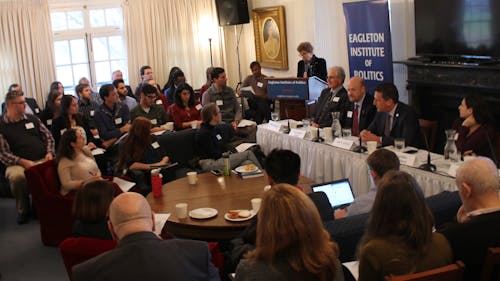Rutgers pushes for scientific policymaking through new Eagleton fellowship

The Eagleton Institute of Politics just launched a one-year fellowship program that places recent science and engineering Ph.D.s within specific departments of state government.
The program will put four fellows through an intensive orientation and professional development program so that they can serve as content experts for state legislators. The goal is to use science to encourage evidence-based decision making in politics, said physicist and New Jersey Assemblyman Andrew Zwicker (D-N.J.).
“There is an enormous number of issues in government where an understanding of scientific methods and evidence is essential to making sound decisions. We have come to realize that society would be better off if there were more scientists working in government and if more scientists, wherever they worked, understood how government works," said Eagleton Professor John Weingart.
Weingart said the program was designed in the spirit of the following quote by former New York Senator Daniel Patrick Moynihan: “Everyone is entitled to their own opinion, but they’re not entitled to their own facts.”
The hope is that the program will be a small step toward getting facts to be more prominent in the discussion and deliberation of government, Weingart said.
Weingart, with his firsthand experience working with science issues in the New Jersey state legislature, said he oversees the program and spearheaded its founding with Zwicker.
After speaking to a colleague in California and reaching out to Weingart, Zwicker worked with Eagleton to create a proposal for the funding of a pilot program. The proposal was then approved by the state legislature, Zwicker said.
“That’s how the program got off the ground," Zwicker said. “It all fell into place.”
Eagleton was chosen for the planning grant by a selection committee, because the University has been working on related issues for years, Zwicker said.
Eagleton has also held related programs and workshops such as the Eagleton Science and Politics Workshop (ESPW) for years, Weingart said. The fellowship program is the next step in expanding the vision.
The fellows will be contributing to policies on solar energy, medical marijuana and autonomous driving. But their contributions go far beyond technical issues, Zwicker said.
“Legislators on both sides of the aisle have enormous respect and appreciation of science. One of the major problems in Washington, D.C. is that too often, facts are not even considered before we get to politics,” Zwicker said. “I know many colleagues, both Democrats and Republicans, who will eagerly welcome scientific advice into things that go well beyond science.”
Hopefully, Zwicker said, the program will introduce scientists to something they may consider as a career. Some may return to the laboratory and others may use their science background to do more with policy, which is a decision that will be made at the end of the program.
But the overarching mission of the program is two-fold, Zwicker said.
“First, provide a level of scientific expertise to state legislators that is not always accessible. That's a valuable resource. Second, introduce the fellows in the first class and the following classes to what's going on in Trenton and how they can be an effective piece of crafting evidence-based public policy that can improve the lives of New Jerseyans,” he said.
This past Sunday, Zwicker and representatives from Eagleton presented a session on the partnerships between scientists and state legislators at the American Association for the Advancement of Science (AAAS) conference in Washington, D.C. The goal of this is to spread the word about what is going on in New Jersey, Zwicker said.
The fellowship, the first of its kind to impact New Jersey state government, was inspired by state and federal programs run by the California Council on Science Technology (CCST) and the AAAS, Weingart said.
While the team is optimistic, it acknowledges that these are only the first steps toward bridging science and politics, Weingart said.
“We don’t expect to revolutionize the world or even New Jersey with four students in one year. But we hope to plant seeds that can be nurtured,” Weingart said.



